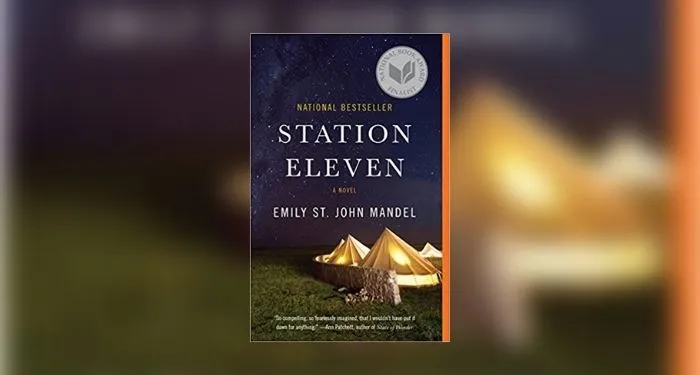
The Changing Impact of Books and Timeless Truths: Thoughts While Reading STATION ELEVEN
It’s been eight years since Station Eleven by Emily St. John Mandel published in 2014, and I’ve finally read it. The curious title and the alluring cover with its dark, starry sky and glowing canvas tents has intrigued me since I first saw it. Watching the trailer for the recent HBO series premiere jarred me into finally picking the book up. I know, I’m late to the party. I was that way with the show Lost, too, though I still love talking about it to anyone who will listen. As with Lost, the world of Station Eleven enthralled me. Yet, I also began thinking about how the impact of Station Eleven has changed with time.
Station Eleven opens on a snowy night in Toronto as a famous Hollywood actor, Arthur Leander, dies onstage from a mysterious flu while performing in King Lear. Mandel then moves between the early days of the pandemic and 20 years later in a world with few survivors left. We meet a cast of characters who knew Arthur, including a child actress named Kirsten. Kirsten later journeys between the remnants of society fringing Lake Michigan, performing Shakespeare in the Traveling Symphony.
As a reader, I am looking at this book with a different lens than a reader at the time of the book’s publishing. This is a story about a pandemic, and unlike the world of 2014, we’re two years deep in a pandemic now.
Jeevan was crushed by a sudden certainty that this was it, that this illness Hua was describing was going to be the divide between a before and an after, a line drawn through his life.
Station Eleven, page 20
That’s how I feel about the world before 2019. There’s the life I knew before the COVID-19 pandemic and the life after.
The Impact of Books Can Change With Time
Reading Station Eleven has nudged me to reflect on books and their impacts. An author may have particular impacts in mind when writing a book. As time passes after publication though, these messages and ideas can affect readers in different ways. The times we live in have the power to change us, no matter how subtly or, perhaps, not-so-subtly.

While the quotes from Station Eleven might not have seemed out of the ordinary in a pandemic book for a reader in 2014, they hit me hard when I read them in 2021.
- “The ER’s full of new cases. We’ve got beds parked in the hallways.” (p. 18)
- “I’m saying you should leave now. Or if you can’t leave, at least stock up on food and stay in your apartment.” (p. 20)
- “For a while they’d lived in front of the television news, low volume, a murmured litany of nightmares that left them drained and reeling, drifting in and out of sleep…Days slipped past and the news went on and on until it began to seem abstract, a horror movie that wouldn’t end.” (p. 176)
Every time I came upon quotes like these that paralleled our experiences with COVID-19, my heart gave a little jolt. It’s cathartic and a little scary to read passages from an apocalyptic pandemic book that you can relate to now. It’s what drew me to this book in the first place. I was seeking the words to make sense of the catastrophe we’ve found ourselves in.
Some of the passages in Station Eleven felt so spot on to what we’re facing now, they came across as eerily prophetic. It makes me wonder, how have other books’ messages changed over time? What were authors thinking their readers would feel as they read their words? Could they envision what future readers would feel?
Yet, Some Truths Within Books Feel Timeless
Station Eleven is a book about a pandemic, but it is also a book about humanity, our resilience, and the things that make life beautiful and worth living. Despite how much a book’s impact can change, I’d argue there are still truths “universally acknowledged” (as Jane Austen would say) that books can offer the world.
I came across these slices of wisdom within Station Eleven that I think ring true no matter when a reader picks up the book. I’ve included a few below. Though, as every reader may interpret a book differently, you might pick out different truths.
People Matter
“Kirsten slept fitfully, aware each time she woke of the emptiness of the landscape, the lack of people and animals and caravans around her. Hell is the absence of the people you long for.”
p. 144
These words struck such a powerful cord within me. It’s being with the people we love that makes life worth living. While this has grown all the more apparent amidst the isolation from COVID, I see it also as a truth of the human experience.
What is Life Without Meaning?
“All three caravans of the Traveling Symphony are labeled as such, THE TRAVELING SYMPHONY lettered in white on both sides, but the lead caravan carries an additional line of text: Because survival is insufficient.”
p. 58
This line, “survival is insufficient,” is drawn from Star Trek, and its meaning exposes a truth not always acknowledged. Surviving is not the same as living. What is life if we cannot draw meaning from it through art, expression, and purpose? I see these as fundamental to what makes us human.

Beauty Lives On in Words and Ideas, Too
Sometimes, the impact of a book is not just the universal truths it reveals, but the beauty in the ideas it draws to mind and how the words make you feel. Station Eleven had many of those moments for me. The words would sink in, and I would feel something.
We traveled so far and your friendship meant everything. It was very difficult, but there were moments of beauty. Everything ends. I am not afraid.”
p. 302
After finishing Station Eleven, these words in particular have stuck with me. They are heartbreaking yet hopeful, sad and comforting. Reading this quote makes me feel all of those things. It’s fulfilling in a way that’s hard to put into words. They fill me up with something I didn’t realize I was seeking.
A Few Final Thoughts
It’s interesting to think about books and the paradox of their impacts. As time passes and new experiences shape the world, the impact of books can change. Yet books also present truths of the human experience that feel relevant no matter when they’re read.
I approached reading Station Eleven with a sense of awe at how much its impact has changed since 2014. This story took hold of me in a way it could not have had I read it years earlier. If I read it before COVID, I would not have been affected so strongly by the gravity of a pandemic. I would not have related to as many of the situations the characters endured. I might not have seen myself so clearly in their experiences.
However, for as many moments that I felt the book’s impact changed for me by reading it in 2021, I also unearthed underlying truths that felt unchanged, such as the power of human connection and creative expression. Despite the new experiences humanity will face in future generations, I hope ideas like these will continue to feel true.
How have the impacts of the books you’ve read changed with time? What truths still feel the same? I think the greatest impact a book can have, regardless of how its messages change, is how it makes you feel. It’s the reason I read. I read to feel something and to feel a part of something greater than myself and my own little station.









